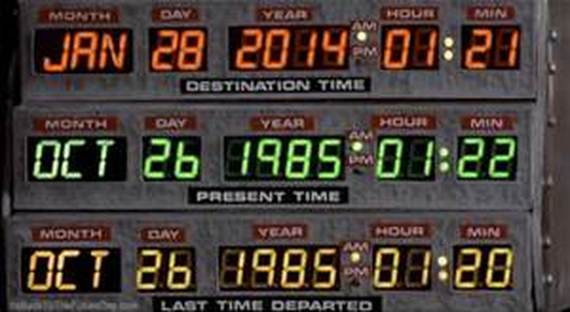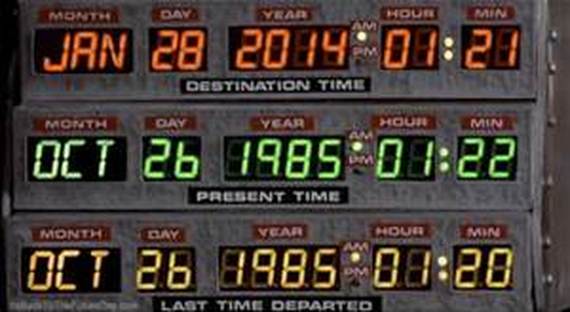
Thursday, October 21st was apparently ‘Back to the Future’ day – the day to which the characters played by Michael J. Fox and Christopher Lloyd were propelled forward in time in Back to the Future II exactly 30 years ago. The occasion was marked in the UK with their legendary De Lorean sports car being rolled out again and the imaginary hover-boards that appeared in the movie being compared with the actual, albeit primitive versions that are available today. In one sense it was a day of whimsy, but in another sense it was a reminder that people are not only interested in predictions about the future, but more so in whether or not they are actually fulfilled.
It is interesting that this anniversary fell at a time when other things are happening on the world stage that have an ominous air of déjà vu in relation to what was happening three decades ago. The Cold War was still very much a reality and the idea of world peace was little more than a fragile dream. The intervening years, of course, saw the collapse of communism in many parts of the world and in its place came very tangible progress in international relations and global stability. However, recent events in the Ukraine, the Middle East and Far East have resurrected old concerns.
Reflecting on the twists and turns of this period of recent history, it is curious to see the extent to which they are interwoven with popular attitudes towards eschatology. The global insecurity of the post-WW2 and Cold War years made for very fertile soil in which fanciful premillennialism flourished. Hal Lindsay and other populist authors like him (along with their God-TV counterparts) allowed their imaginations and those of their audiences to run wild over ‘obvious’ fulfilments of end-times prophecies. From the rise of the Common Market in Europe (now the EU), through to Henry Kissinger being the False Prophet, all kinds of ‘evidence’ was adduced as supposed sure signs the end was nigh. (Though, interestingly, they didn’t seem to link the Pope with the Antichrist –they were obviously not Westminster Confession men!)
After the collapse of communism in the Soviet Union and the era of relative peace and prosperity it ushered in in the West, fascination with prophecies about the end of the world went somewhat out of fashion. But when that newfound sense of security was shaken afresh with two Gulf wars, 9/11 and a war in Afghanistan that dragged on for 13 years, there was no return to the levels of interest in end times predictions of 25 years earlier. It was perhaps because of the sheer outrageousness of the claims made in that era that eschatology got a bad name in the church as much as in the wider world.
The Reformed community within the church, for the most part, was the exception to the rule in terms of the way eschatology was used in those earlier years. Historically the Reformed understanding of eschatology has been more measured. Far from seeing it as confined to the closing stages of world history, Reformed theologians have rightly recognised that eschatology is a rich vein of teaching that runs all the way through the Bible. The protology of Genesis has far more to say about eschatology than people often realise, and eschatological themes are not confined to the apocalyptic literature of Daniel, Zechariah, Revelation plus the handful of specific passages cast in that genre.
In the Old Testament, themes like ‘Eden’, ‘the land’, ‘temple’, ‘worship’ and many more besides unfold along the train lines of progressive revelation and lead ultimately into the eschaton. The language of the prophets – especially Isaiah, Jeremiah and Ezekiel – is overtly eschatological. The Chronicler’s account of Israel’s history is delivered to some extent at least from the perspective of a realised eschatology.
So too in the New Testament: Jesus in the Gospels does not confine his end-times teaching to the Olivet discourse (Mt 24.1-51; Mk 13.1-37; Lk 21.5-36). Instead he weaves it – sometimes on the surface, sometimes just beneath – into parable, miracle and self-disclosure. Eschatological themes recur in the sermons recorded in Acts. They are never far from the surface in the letters either. At the most basic level in they are written from the perspective of ‘the Last Days’. But they are present also in the eschatologically loaded vocabulary of salvation – justification, sanctification and glorification. Reformed theology has rightly acknowledged that eschatology is an inescapable dimension of biblical hermeneutics.
That said, it is questionable as to whether Reformed preachers have woven this eschatological vein into their preaching to the same extent it is woven through the Bible. Yet if we did – especially if we did it in a way that was as natural as the biblical authors themselves – it would add a dimension to our preaching that would not only comfort believers, but would also provide an apologetic edge to how we are heard by unbelievers.
In that sense perhaps we all need to go ‘back to the future’. We need to help our people to grasp that, as Christians, while we very much have to live with one eye on the past and Christ’s once-for-all accomplishment on the cross, we must equally live with an eye on the future and the certainty of his return. To do that will achieve far more than titillating people’s imagination over how to make sense of the times we live in; it will actually help them to be ready for all that lies ahead when Jesus Christ returns.

The Alliance of Confessing Evangelicals is member supported and operates only by your faithful support. Thank you.















 © Alliance of Confessing Evangelicals
© Alliance of Confessing Evangelicals


